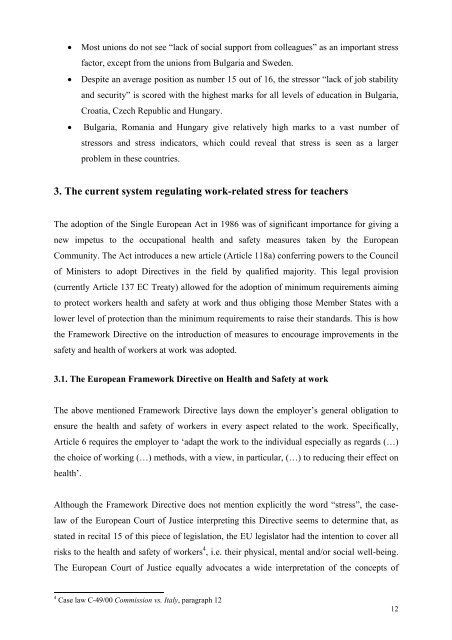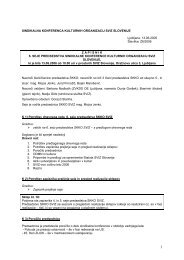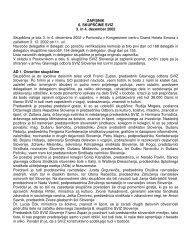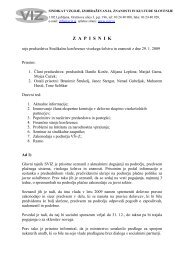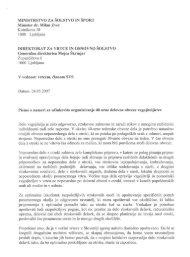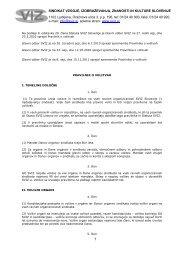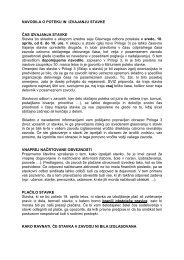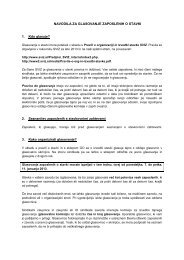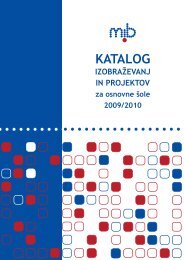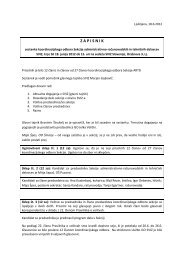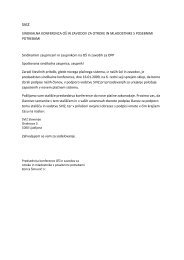Report on the ETUCE Survey on Teachers' Work- related Stress
Report on the ETUCE Survey on Teachers' Work- related Stress
Report on the ETUCE Survey on Teachers' Work- related Stress
You also want an ePaper? Increase the reach of your titles
YUMPU automatically turns print PDFs into web optimized ePapers that Google loves.
• Most uni<strong>on</strong>s do not see “lack of social support from colleagues” as an important stress<br />
factor, except from <strong>the</strong> uni<strong>on</strong>s from Bulgaria and Sweden.<br />
• Despite an average positi<strong>on</strong> as number 15 out of 16, <strong>the</strong> stressor “lack of job stability<br />
and security” is scored with <strong>the</strong> highest marks for all levels of educati<strong>on</strong> in Bulgaria,<br />
Croatia, Czech Republic and Hungary.<br />
• Bulgaria, Romania and Hungary give relatively high marks to a vast number of<br />
stressors and stress indicators, which could reveal that stress is seen as a larger<br />
problem in <strong>the</strong>se countries.<br />
3. The current system regulating work-<strong>related</strong> stress for teachers<br />
The adopti<strong>on</strong> of <strong>the</strong> Single European Act in 1986 was of significant importance for giving a<br />
new impetus to <strong>the</strong> occupati<strong>on</strong>al health and safety measures taken by <strong>the</strong> European<br />
Community. The Act introduces a new article (Article 118a) c<strong>on</strong>ferring powers to <strong>the</strong> Council<br />
of Ministers to adopt Directives in <strong>the</strong> field by qualified majority. This legal provisi<strong>on</strong><br />
(currently Article 137 EC Treaty) allowed for <strong>the</strong> adopti<strong>on</strong> of minimum requirements aiming<br />
to protect workers health and safety at work and thus obliging those Member States with a<br />
lower level of protecti<strong>on</strong> than <strong>the</strong> minimum requirements to raise <strong>the</strong>ir standards. This is how<br />
<strong>the</strong> Framework Directive <strong>on</strong> <strong>the</strong> introducti<strong>on</strong> of measures to encourage improvements in <strong>the</strong><br />
safety and health of workers at work was adopted.<br />
3.1. The European Framework Directive <strong>on</strong> Health and Safety at work<br />
The above menti<strong>on</strong>ed Framework Directive lays down <strong>the</strong> employer’s general obligati<strong>on</strong> to<br />
ensure <strong>the</strong> health and safety of workers in every aspect <strong>related</strong> to <strong>the</strong> work. Specifically,<br />
Article 6 requires <strong>the</strong> employer to ‘adapt <strong>the</strong> work to <strong>the</strong> individual especially as regards (…)<br />
<strong>the</strong> choice of working (…) methods, with a view, in particular, (…) to reducing <strong>the</strong>ir effect <strong>on</strong><br />
health’.<br />
Although <strong>the</strong> Framework Directive does not menti<strong>on</strong> explicitly <strong>the</strong> word “stress”, <strong>the</strong> caselaw<br />
of <strong>the</strong> European Court of Justice interpreting this Directive seems to determine that, as<br />
stated in recital 15 of this piece of legislati<strong>on</strong>, <strong>the</strong> EU legislator had <strong>the</strong> intenti<strong>on</strong> to cover all<br />
risks to <strong>the</strong> health and safety of workers 4 , i.e. <strong>the</strong>ir physical, mental and/or social well-being.<br />
The European Court of Justice equally advocates a wide interpretati<strong>on</strong> of <strong>the</strong> c<strong>on</strong>cepts of<br />
4 Case law C-49/00 Commissi<strong>on</strong> vs. Italy, paragraph 12<br />
12


